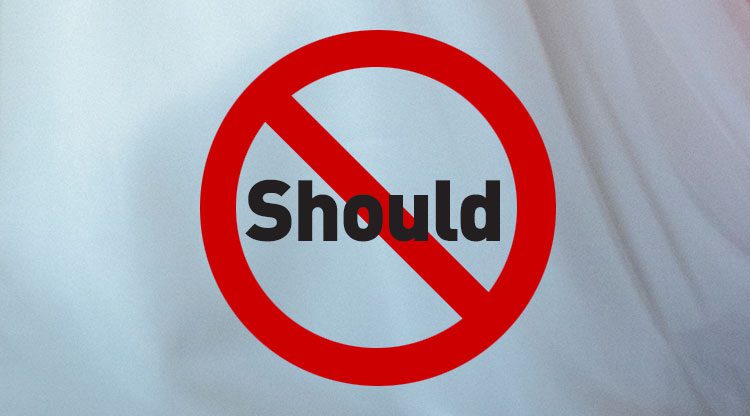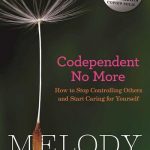Until you make the unconscious conscious, it will direct your life and you will call it fate.- C.G. Jung
Most of our suffering/stress in life is usually a result of the tension between what we believe should be (our expectations) and what is (reality). The key to everlasting happiness is to radically accept whatever happens to you in life, control what you can, and not worry excessively about what you cannot control. A lot of our shoulds and musts are tools that served us growing up, and it was handed to us as scripts by our parents, society, religion, caregivers, peers, etc., as rules and regulations, dos and don’t. Cultural norms, religious dictums, etc.
Your time is limited, so don’t waste it living someone else’s life. Don’t be trapped by dogma — which is living with the results of other people’s thinking. Don’t let the noise of others’ opinions drown out your own inner voice. And most important, have the courage to follow your heart and intuition. They somehow already know what you truly want to become. Everything else is secondary. – Steve Jobs
The Tyranny of the Shoulds – Karen Horney
German Psychoanalyst Karen Horney called this “The Tyranny of the Shoulds.” In her book, Neurosis and Human Growth, she posits that we switch between self-hating our inferior selves and pretend to live up to the unattainable ideal of what we should be. The “Shoulds” divides us into two selves: an ideal self and a real self. The real self is who we actually are, and the ideal self is who we strive to become. She Writes
Unlike Pygmalion, who tried to make another person into a creature fulfilling his concept of beauty, the neurotic sets to work to mold himself into a supreme being of his own making. He holds before his soul his image of perfection and unconsciously tells himself: “Forget about the disgraceful creature you actually are; this is how you should be, and to be this idealized self is all that matters. You should be able to endure everything, to understand everything, to like everybody, to be always productive”—to mention only a few of these inner dictates. Since they are inexorable, I call them “the tyranny of the should.”
“The inner dictates comprise all that the neurotic should be able to do, to be, to feel, to know—and taboos on how and what he should not be.”
The shoulds are as much determined by self-hate as by pride, and the furies of self-hate are unleashed when they are not fulfilled. They can be compared to a holdup in which a gunman points a revolver at a person, saying: “Either you give me all you have, or else I’ll shoot you.” The gunman’s holdup is likely to be the more humane of the two. It is possible for the threatened person to save himself by complying, while the shoulds cannot be appeased. And also, being shot, for all the finality of death, seems less cruel than a lifelong suffering under self-hate.
The shoulds are in fact self-destructive in their very nature. They put a person into a straitjacket and deprive him of inner freedom. Even if he manages to mold himself into a behavioristic perfection, he can do so only at the expense of his spontaneity and the authenticity of his feelings and beliefs. The shoulds aim in fact, like any political tyranny, at the extinction of individuality. They create an atmosphere similar to that in the seminary described by Stendhal in The Red and the Black (or George Orwell in Nineteen Eighty-Four), in which any individual thinking and feeling are suspect. They require an unquestioning obedience, which is not even felt as obedience.
Another frequent should demand of a person that he assumes full responsibility for his relatives, friends, pupils, employees, etc. He should be able to solve everyone’s problem to everyone’s instant satisfaction. This implies that anything that goes wrong is his fault. If a friend or relative is upset for any reason, complains, criticizes, is discontented, or wants something, such a person is forced to be the helpless victim who must feel guilty and set everything right. He is, to quote a patient, like the harassed manager of a summer hotel: the guests are always right. Whether or not any of the mishaps are actually his fault does not matter.”
Any person subjected to a tyrannical regime will resort to means of circumventing its dictates. He is forced into a duplicity which, in the case of an external tyranny, may be entirely conscious. In the case of the inner tyranny, which in itself is unconscious, the subsequent duplicity can have only the character of unconscious self-deceptive pretenses.
Domestication of the Human Mind
We all have the tendency for falling for the trap of “The Tyranny of Shoulds” as it started during our childhood. As kids, we got domesticated the same way they domesticate animals like cats and dogs.
In the Four Agreements: A Practical Guide to Personal Freedom, author Don Miguel Ruiz writes about this domestication and our helpless agreement to it.
Through this domestication we learn how to live and how to dream. In human domestication, the information from the outside dream is conveyed to the inside dream, creating our whole belief system.
He writes:
As children, we didn’t have the opportunity to choose our beliefs, but we agreed with the information that was passed to us from the dream of the planet via other humans. The only way to store information is by agreement. The outside dream may hook our attention, but if we don’t agree, we don’t store that information. As soon as we agree, we believe it, and this is called faith. To have faith is to believe unconditionally.
That’s how we learn as children. Children believe everything adults say. We agree with them, and our faith is so strong that the belief system controls our whole dream of life. We didn’t choose these beliefs, and we may have rebelled against them, but we were not strong enough to win the rebellion. The result is surrender to the beliefs with our agreement.
Through this domestication we learn how to live and how to dream. In human domestication, the information from the outside dream is conveyed to the inside dream, creating our whole belief system. First the child is taught the names of things: Mom, Dad, milk, bottle. Day by day, at home, at school, at church, and from television, we are told how to live, what kind of behavior is acceptable. The outside dream teaches us how to be a human. We have a whole concept of what a “woman” is and what a “man” is. And we also learn to judge: We judge ourselves, judge other people, judge the neighbors.
When we went against the rules we were punished; when we went along with the rules we got a reward. We were punished many times a day, and we were also rewarded many times a day. Soon we became afraid of being punished and also afraid of not receiving the reward. The reward is the attention that we got from our parents or from other people like siblings, teachers, and friends. We soon develop a need to hook other people’s attention in order to get the reward.
Children are domesticated the same way that we domesticate a dog, a cat, or any other animal. In order to teach a dog we punish the dog and we give it rewards. We train our children whom we love so much the same way that we train any domesticated animal: with a system of punishment and reward. We are told, “You’re a good boy,” or “You’re a good girl,” when we do what Mom and Dad want us to do. When we don’t, we are “a bad girl” or “a bad boy.”
All our normal tendencies are lost in the process of domestication. And when we are old enough for our mind to understand, we learn the word no. The adults say, “Don’t do this and don’t do that.” We rebel and say, “No!” We rebel because we are defending our freedom. We want to be ourselves, but we are very little, and the adults are big and strong. After a certain time we are afraid because we know that every time we do something wrong we are going to be punished
We got domesticated from our upbringing and this constituted the core of our belief system such as our Shoulds, Musts, Dos and Don’t, value system, etc. Most of us never question the scripts handed to us by our well-meaning parents, caregivers, teachers, and society. They used different strategies to make us conform to their worldviews and belief system by using emotional blackmail among other tactics.
Emotional Blackmail – FOG (Fear, Obligation and Guilt)
In her book, Emotional Blackmail: When the People in Your Life Use Fear, Obligation, and Guilt to Manipulate You, Therapist and Best Selling Author Susan Forward, Ph.D. writes about the tools used by people around us to manipulate us and make us convince ourselves we have to do anything. She writes:
FOG is a shorthand way of referring to Fear, Obligation, and Guilt, the tools of the blackmailer’s trade. Blackmailers pump an engulfing FOG into their relationships, ensuring that we will feel afraid to cross them, obligated to give them their way, and terribly guilty if we don’t.
Fear
Blackmailers build their conscious and unconscious strategies on the information we give them about what we fear. They notice what we run away from, see what makes us nervous, observe when our bodies go rigid in response to something we’re experiencing. It’s not that they’re taking notes and actively filing them away for later use against us—we all absorb this knowledge about the people we’re close to. In emotional blackmail, fear works a transformation on the blackmailer, too
Fear moves us into black-and-white—even catastrophic—thinking.
OBLIGATION
We all come into our adult lives with well-established rules and values regarding how much of ourselves we owe to other people and how much of our behavior ought to be determined by such ideals as duty, obedience, loyalty, altruism and self-sacrifice. We all have deeply ingrained ideas about these values, and often we think they’re our own ideas, but actually they were shaped by the influence of our parents, our religious backgrounds, the prevailing beliefs of society, the media and the people we’re close to.
Most of us have a terrible time defining our boundaries, where our obligations to others begin and end. And when our sense of obligation is stronger than our sense of self-respect and self-caring, blackmailers quickly learn how to take advantage.
GUILT
Guilt is an essential part of being a feeling, responsible person. It’s a tool of the conscience that, in its undistorted form, registers discomfort and self-reproach if we’ve done something to violate our personal or social code of ethics. Guilt helps to keep our moral compass working, and because it feels so painful, it dominates our attention until we do something to relieve it. To avoid guilt, we try to avoid doing harm to someone else.
Emotional blackmailers encourage us to take global responsibility for their complaints and unhappiness, doing all they can to reprogram the basic and necessary mechanisms of appropriate guilt into an undeserved-guilt production line where the lights continually flash guilty, guilty, guilty.
Although we may find it hard to believe that people we love would want to manipulate us but unfortunately, it happens a lot. They create the FOG by using Fear, Obligation, and Guilt to hand us the scripts that direct the course of our lives on a continuous basis. Most of our loved ones have good intentions but most of the time they do it unconsciously has they have also been handed the scripts by their own parents, society, religion and environment. The key is to question our belief system and always ask “Do I really have to do this?”. One other tool that compels us to do what we don’t really want to do is the Media/Social Media.
Social Media – Social Conditioning and Programming
One of the greatest innovations of the 21st century is Social Media. It has enabled us to connect better and get things done. But Social Media is one of the greatest tools used for social and mental conditioning, programming, and influencing us. The platforms tap into our core human inclination to be part of a group and feel wanted. Advertisers exploit this basic human tendency to condition us to influence ourselves. We say to ourselves: I have to buy the latest car without even questioning if we really need a car; we say, “I have to/I must have that,” but in reality, we have been conditioned and programmed to have these shoulds and must.
“The mass of men lead lives of quiet desperation. What is called resignation is confirmed desperation. From the desperate city you go into the desperate country, and have to console yourself with the bravery of minks and muskrats. A stereotyped but unconscious despair is concealed even under what are called the games and amusements of mankind. There is no play in them, for this comes after work. But it is a characteristic of wisdom not to do desperate things.” – Henry David Thoreau, Civil Disobedience and Other Essays
One of the greatest key to happiness have found is this: “You Do not have to do anything”. Most of us lead lives of quiet desperation as noted by Henry David Thoreau and we tiptoe towards our grave trying to live up to other peoples expectation of us, we settle for less than we can achieve, we don’t follow our bliss or live our truth; hence we live an unhappy and miserable life. Our time here is very limited and living to comply with other peoples expectations of us is not sustainable.

All the Best in your quest to get Better. Don’t Settle: Live with Passion.



Comments are closed.